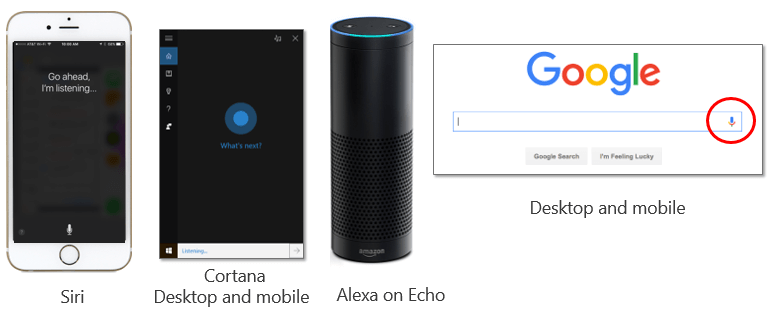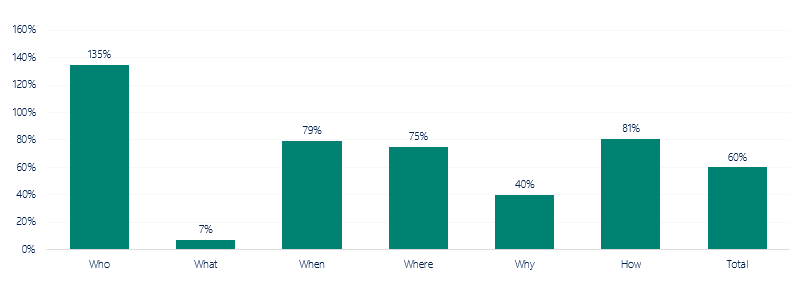SHARE
SEO Is Finding Its VOICE. What’s Next?
Gartner, a Connecticut-based technology research firm, has predicted that 30 percent of all web browsing will be screenless by 2020. Instead of typing and looking at electronic devices, people will request information out loud and a gadget will supply the answer in a humanlike voice. Of course, such systems already exist, including Amazon Echo and Google Home. How will this technology impact our daily lives, and how can companies of all sizes prepare for the coming tsunami of voice searches?

Ramp up Your Multitasking
Obviously, when you voice-search the Internet you don’t need to use your hands or eyes, which leaves them free to do other things. You can conduct searches while lifting weights, cooking dinner or even commuting to work, and the conveniences don’t stop there. Consider My Starbucks® barista. The Starbucks coffee chain is developing it now, and about 1,000 people are testing it out. This app lets customers verbally order online before arriving at a Starbucks coffeehouse. You can expect many other brands to kick off similar programs soon.
Local Businesses Get Ready to Rumble
Voice search has the potential to affect every industry and every company; however, it may have the greatest effect on local businesses. As consumers are driving or walking around, many will ask their mobile devices about nearby restaurants and other establishments. The competition for the top few spots on search engine results pages (SERPs) will become even fiercer, making cutting-edge SEO services more crucial. After all, with screen SERPs, people often scroll down and check out a variety of options. With voice results, though, it’s the rare individual who will listen to a long list being read aloud.
Verbosity Leads to Long-Tail Advantages
The rise of voice search will make long-tail keywords much more important to SEO. When people type their search queries, they tend to use just a few words. For instance, someone might enter “dry cleaner” and “Raleigh.” By contrast, when consumers utilize voice search, their entries usually become longer and more specific. Their search terms resemble questions they’d ask other people. For example, a consumer might search for the following: “Where can I find an affordable dry cleaner in Raleigh?”

Credit: https://moz.com/
With that in mind, search engine algorithms should start to favor long-tail keywords, which come in many variations. As a result, your blog posts, web articles and other online materials will need a wide range of relevant long-tail keywords, and you’ll probably have to post significantly more content than you did in the past. As ever, ongoing analytics research will be critical; you should always know the most popular questions among your target customers. You should also include variants of those questions throughout your website to see which ones benefit your SEO practices the most.
The Future of SEO Is Anybody’s Guess
It’s hard to say where voice search will ultimately lead. Will most people eventually depend on a combination of voice activation and typing? Or maybe voice search will become so popular that it’ll render today’s Internet obsolete. It’s too soon to eulogize traditional SEO. Still, it’s important for brands to start planning for a time, which might be only a few years away, when voice search dominates the ways in which we humans obtain and process information.
SEO Is Finding Its VOICE. What’s Next?
SHARE
Gartner, a Connecticut-based technology research firm, has predicted that 30 percent of all web browsing will be screenless by 2020. Instead of typing and looking at electronic devices, people will request information out loud and a gadget will supply the answer in a humanlike voice. Of course, such systems already exist, including Amazon Echo and Google Home. How will this technology impact our daily lives, and how can companies of all sizes prepare for the coming tsunami of voice searches?

Ramp up Your Multitasking
Obviously, when you voice-search the Internet you don’t need to use your hands or eyes, which leaves them free to do other things. You can conduct searches while lifting weights, cooking dinner or even commuting to work, and the conveniences don’t stop there. Consider My Starbucks® barista. The Starbucks coffee chain is developing it now, and about 1,000 people are testing it out. This app lets customers verbally order online before arriving at a Starbucks coffeehouse. You can expect many other brands to kick off similar programs soon.
Local Businesses Get Ready to Rumble
Voice search has the potential to affect every industry and every company; however, it may have the greatest effect on local businesses. As consumers are driving or walking around, many will ask their mobile devices about nearby restaurants and other establishments. The competition for the top few spots on search engine results pages (SERPs) will become even fiercer, making cutting-edge SEO services more crucial. After all, with screen SERPs, people often scroll down and check out a variety of options. With voice results, though, it’s the rare individual who will listen to a long list being read aloud.
Verbosity Leads to Long-Tail Advantages
The rise of voice search will make long-tail keywords much more important to SEO. When people type their search queries, they tend to use just a few words. For instance, someone might enter “dry cleaner” and “Raleigh.” By contrast, when consumers utilize voice search, their entries usually become longer and more specific. Their search terms resemble questions they’d ask other people. For example, a consumer might search for the following: “Where can I find an affordable dry cleaner in Raleigh?”

Credit: https://moz.com/
With that in mind, search engine algorithms should start to favor long-tail keywords, which come in many variations. As a result, your blog posts, web articles and other online materials will need a wide range of relevant long-tail keywords, and you’ll probably have to post significantly more content than you did in the past. As ever, ongoing analytics research will be critical; you should always know the most popular questions among your target customers. You should also include variants of those questions throughout your website to see which ones benefit your SEO practices the most.
The Future of SEO Is Anybody’s Guess
It’s hard to say where voice search will ultimately lead. Will most people eventually depend on a combination of voice activation and typing? Or maybe voice search will become so popular that it’ll render today’s Internet obsolete. It’s too soon to eulogize traditional SEO. Still, it’s important for brands to start planning for a time, which might be only a few years away, when voice search dominates the ways in which we humans obtain and process information.
SEO Is Finding Its VOICE. What’s Next?
SHARE
Gartner, a Connecticut-based technology research firm, has predicted that 30 percent of all web browsing will be screenless by 2020. Instead of typing and looking at electronic devices, people will request information out loud and a gadget will supply the answer in a humanlike voice. Of course, such systems already exist, including Amazon Echo and Google Home. How will this technology impact our daily lives, and how can companies of all sizes prepare for the coming tsunami of voice searches?

Ramp up Your Multitasking
Obviously, when you voice-search the Internet you don’t need to use your hands or eyes, which leaves them free to do other things. You can conduct searches while lifting weights, cooking dinner or even commuting to work, and the conveniences don’t stop there. Consider My Starbucks® barista. The Starbucks coffee chain is developing it now, and about 1,000 people are testing it out. This app lets customers verbally order online before arriving at a Starbucks coffeehouse. You can expect many other brands to kick off similar programs soon.
Local Businesses Get Ready to Rumble
Voice search has the potential to affect every industry and every company; however, it may have the greatest effect on local businesses. As consumers are driving or walking around, many will ask their mobile devices about nearby restaurants and other establishments. The competition for the top few spots on search engine results pages (SERPs) will become even fiercer, making cutting-edge SEO services more crucial. After all, with screen SERPs, people often scroll down and check out a variety of options. With voice results, though, it’s the rare individual who will listen to a long list being read aloud.
Verbosity Leads to Long-Tail Advantages
The rise of voice search will make long-tail keywords much more important to SEO. When people type their search queries, they tend to use just a few words. For instance, someone might enter “dry cleaner” and “Raleigh.” By contrast, when consumers utilize voice search, their entries usually become longer and more specific. Their search terms resemble questions they’d ask other people. For example, a consumer might search for the following: “Where can I find an affordable dry cleaner in Raleigh?”

Credit: https://moz.com/
With that in mind, search engine algorithms should start to favor long-tail keywords, which come in many variations. As a result, your blog posts, web articles and other online materials will need a wide range of relevant long-tail keywords, and you’ll probably have to post significantly more content than you did in the past. As ever, ongoing analytics research will be critical; you should always know the most popular questions among your target customers. You should also include variants of those questions throughout your website to see which ones benefit your SEO practices the most.
The Future of SEO Is Anybody’s Guess
It’s hard to say where voice search will ultimately lead. Will most people eventually depend on a combination of voice activation and typing? Or maybe voice search will become so popular that it’ll render today’s Internet obsolete. It’s too soon to eulogize traditional SEO. Still, it’s important for brands to start planning for a time, which might be only a few years away, when voice search dominates the ways in which we humans obtain and process information.
